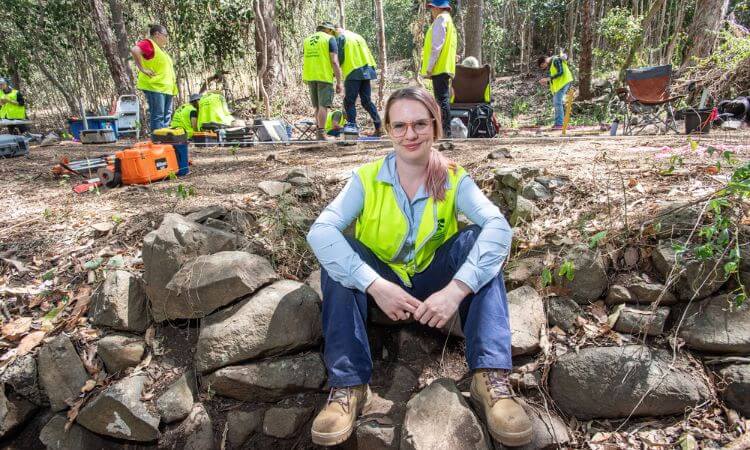Beneath the shade of the hoop pines and eucalypts in Toowoomba’s Redwood Park lay the remnants of a sanctuary: a pocket of history, preserved in the woods.
There in Redwood Park, right beside the old Toowoomba Range, is where you’ll find Eagles Nest Camp – one of the only known examples of a camp for unemployed and itinerant men in Queensland during the 1930s.
University of Southern Queensland (UniSQ) Professor of Anthropology and Archaeology Lara Lamb said students had been helping to excavate the Depression-era camp as part of the University’s inaugural Archaeology Field School.
“Eagles Nest Camp was built around 1929 as a charitable institution for men who were quite desperate and out of work, with no food and no money,” Professor Lamb said.
“Men came from all over the country to Toowoomba because this was one of the only places where they could find shelter and food. It was a place of quiet desperation,” she said.
And although it was a difficult time, the men living at Eagles Nest Camp made it feel like a home as best they could.
They took great pride in the camp being mostly self-constructed and self-sufficient. The men even cultivated immaculate vegetable gardens, flower beds, and cobblestone footpaths.
And while Eagles Nest Camp is a humbling reminder of a difficult time in Australian history, it also serves as a testament to the generosity of the Darling Downs community and its willingness to help those in need.
“We’ve been finding remnants of crockery and cutlery which were donated from restaurants and cafes in town. And we know that local butchers donated offcuts of meat, restaurants donated leftover food, and retailers donated clothes and shoes,” Professor Lamb said.
In fact, community members even donated a library and gramophone with records to ensure the itinerant men at Eagles Nest Camp could find some joy in an otherwise difficult time.
In 1931, an anonymous Eagles Nest Camp resident wrote to the Toowoomba Chronicle and Darling Downs Gazette, describing the camp as “a bright patch of sunlight and peace in the midst of a very stormy and troubled time”.
Professor Lamb said it was a privilege to have such a complex site to teach the students all the technical aspects of an archaeological excavation.
“This excavation involves a lot of survey methods, rigorous, scientific excavations, reading the surveying instrument, and plotting the artefacts that we excavate,” she said.
“Our students will be equipped with all the necessary skills to work as professional archaeological consultants,.
“There is a deficit of those skills in the industry and UniSQ is one of the only field schools to teach all of those skills in rigorous ways. We are filling that niche in a very effective way.
“The students are learning from world-class researchers and are being very well skilled-up to make a significant contribution to archaeology in Australia and internationally.”
University of Southern Queensland Anthropology and Archaeology student Victoria Wood said it was amazing to put all her theoretical knowledge into practice at the Eagles Nest Camp Field School.
“To come here and actually get our hands dirty doing some of this field work has been such a great experience,” Ms Wood said.
“Being able to come here and unearth these things, and be the first person to see some of these items in almost a hundred years, has been an absolute privilege.
“I think history often repeats itself. The more we understand about our history, the more that we can understand our future and make sure that we're heading in a positive direction.”
Student Frances Hicks said it was fascinating to uncover details about Eagles Nest Camp in the 1930s, and use those details to understand what the men themselves may have been like.
“We can tell these men were extremely tidy and organised, and they had a real respect for their area and a sense of pride in everything they were doing,” Ms Hicks said.
The University of Southern Queensland has been archaeologically excavating Eagles Nest Camp since the 1990s with the support of Toowoomba Regional Council.
Find out more about studying Archaeology at the University of Southern Queensland.



